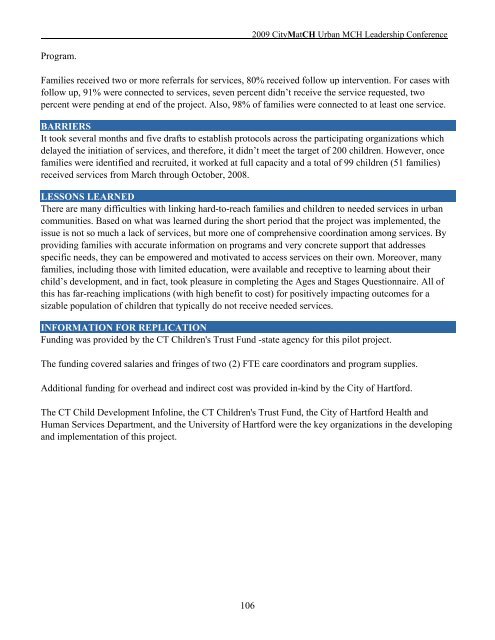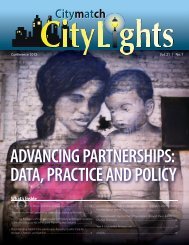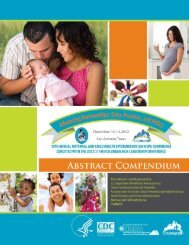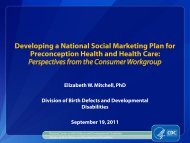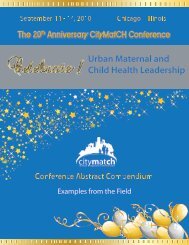Conference Abstract Compendium Examples from the ... - CityMatCH
Conference Abstract Compendium Examples from the ... - CityMatCH
Conference Abstract Compendium Examples from the ... - CityMatCH
You also want an ePaper? Increase the reach of your titles
YUMPU automatically turns print PDFs into web optimized ePapers that Google loves.
2009 <strong>CityMatCH</strong> Urban MCH Leadership <strong>Conference</strong>Program.Families received two or more referrals for services, 80% received follow up intervention. For cases withfollow up, 91% were connected to services, seven percent didn’t receive <strong>the</strong> service requested, twopercent were pending at end of <strong>the</strong> project. Also, 98% of families were connected to at least one service.BARRIERSIt took several months and five drafts to establish protocols across <strong>the</strong> participating organizations whichdelayed <strong>the</strong> initiation of services, and <strong>the</strong>refore, it didn’t meet <strong>the</strong> target of 200 children. However, oncefamilies were identified and recruited, it worked at full capacity and a total of 99 children (51 families)received services <strong>from</strong> March through October, 2008.LESSONS LEARNEDThere are many difficulties with linking hard-to-reach families and children to needed services in urbancommunities. Based on what was learned during <strong>the</strong> short period that <strong>the</strong> project was implemented, <strong>the</strong>issue is not so much a lack of services, but more one of comprehensive coordination among services. Byproviding families with accurate information on programs and very concrete support that addressesspecific needs, <strong>the</strong>y can be empowered and motivated to access services on <strong>the</strong>ir own. Moreover, manyfamilies, including those with limited education, were available and receptive to learning about <strong>the</strong>irchild’s development, and in fact, took pleasure in completing <strong>the</strong> Ages and Stages Questionnaire. All ofthis has far-reaching implications (with high benefit to cost) for positively impacting outcomes for asizable population of children that typically do not receive needed services.INFORMATION FOR REPLICATIONFunding was provided by <strong>the</strong> CT Children's Trust Fund -state agency for this pilot project.The funding covered salaries and fringes of two (2) FTE care coordinators and program supplies.Additional funding for overhead and indirect cost was provided in-kind by <strong>the</strong> City of Hartford.The CT Child Development Infoline, <strong>the</strong> CT Children's Trust Fund, <strong>the</strong> City of Hartford Health andHuman Services Department, and <strong>the</strong> University of Hartford were <strong>the</strong> key organizations in <strong>the</strong> developingand implementation of this project.106


